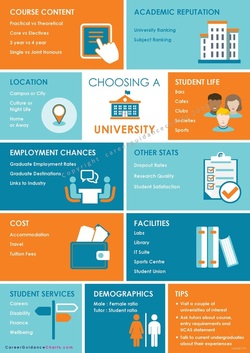|
How to decide on your place of study isn't an easy process. In part your decision will be made by the kind of course you want to do and perhaps were you might like to study but there are other factors to consider. In this careers poster blog we've listed these key factors in our new career poster graphic available for schools. This is a great graphic for 6th forms, study areas and career library areas. View more at our store  Course Content This can be seen as the number one factor when choosing a place of study. In fact, 73% of applicants said course content was important when making their choice. It’s imperative to investigate course content carefully; this is because often similar sounding courses actually cover significantly different subject areas. Academic Reputation Where are they in the University league tables? Six in ten applicants say that overall academic reputation is important when deciding upon a place of study. Having a degree from a highly ranked university can give you an advantage with employers and in certain career sectors. Graduate Employment Rates Graduate employment rates reveal the percentage of university graduates in employment or further study six months after graduating. Six in ten university applicants said that graduate employment rates were important when deciding upon a place of study Academic Facilities 58% of applicants said that the quality of the university’s academic facilities is important when deciding where to study. Academic facilities may include the library, IT suites or laboratories. University and Employer Links 50% of university applicants said that links between the university and employers is important when making their university choice. When completing a more vocational type degree these links can be of particular value. Location Location can also be seen as an important factor when deciding upon where to study for university applicants. Some students may want to live in places where there is a lot to do, or somewhere that has a vibrant night life. Alternatively other students may prefer somewhere rich in culture, where they can investigate history and meet lots of different types of people. Another thing to factor in to this decision is how close you want to live to home; some students may want to branch out and move far away while others may prefer to remain in familiar territory. Student Life It is also worth considering a school’s extra-curricular activities as some universities may offer a greater number or variety to choose from. Extracurricular activities could consist of clubs, volunteer opportunities, sports groups or even being part of a religious organisation. School’s Demographics When students are deciding upon a place of study they may have a particular preference relating to the schools demographics. For instance some may be interested in a university with a particular race or religious affiliation. Another notable factor in this decision could be male to female ratio within the university. Student/Professor Ratio For some university applicants the opportunity to spend one-on-one time with teachers and professors and gain extra support is of primary importance. Because of this it is worth investigating the student to faculty ratio intently. Tutors Does the University have highly qualified professors? A good professor can have a distinctive impact on your studies, adding interest to your degree, and ultimately influencing later life choices. Costs General living costs of the area can also be an important factor when deciding upon university for applicants. Especially important could be the cost of a pint in a local pub or renting costs within the area. Other costs that may impinge more significantly may be the course fees. Student Accommodation Student life and the quality of student accommodation can have an important impact upon a student’s time of study. For those looking to pursue an active student life and make lots of new friends it is worth investigating the percentage of students living on campus.
0 Comments
Engaging students to explore career ideas is no easy task. Many institutions and colleges often tag on career education around the core subjects or invite speakers in classes on occasional basis. Others have a more integrated approach and provide quality guidance activities with a career professional. Which ever end the institution is at, the vital need to have students thinking, exploring and being inspired on their future pathways remains important. When it comes to decisions on school subjects and options beyond high school, the need for clarity on their career plans becomes all the more necessary.
We at Career Guidance Charts seek to support the work of schools in providing careers information in graphic format. Our career posters and infographics suit a generation of students that want the information at an instant. We answer the question? What can I do with English? What can I do with Geography? with our range of career charts that point to potential pathways. It only needs a glance from a student whilst waiting for teacher, or standing in a queue to see one of our vibrant career posters that might inspire them to ponder for a moment a potential career pathway. For those students with no real ideas, the need for such infographics to engage them with where they can take a subject of interest or skill they have can prove incredibly helpful. Having displays in schools also adds the greater sense that a school is gearing its students to the future world of work. The intense reality of education and learning meets the external world of careers and points your students to the life that is beyond the four walls. With over 130 career posters in our collection, we are confident we can provide the career infographics you might need for class, corridor, career library or career resource area. |
Russ BannerI have 10 years experience of working in careers guidance and am director of CGC. We publish career infographics for schools and colleges Archives
November 2022
Categories |
|
|
